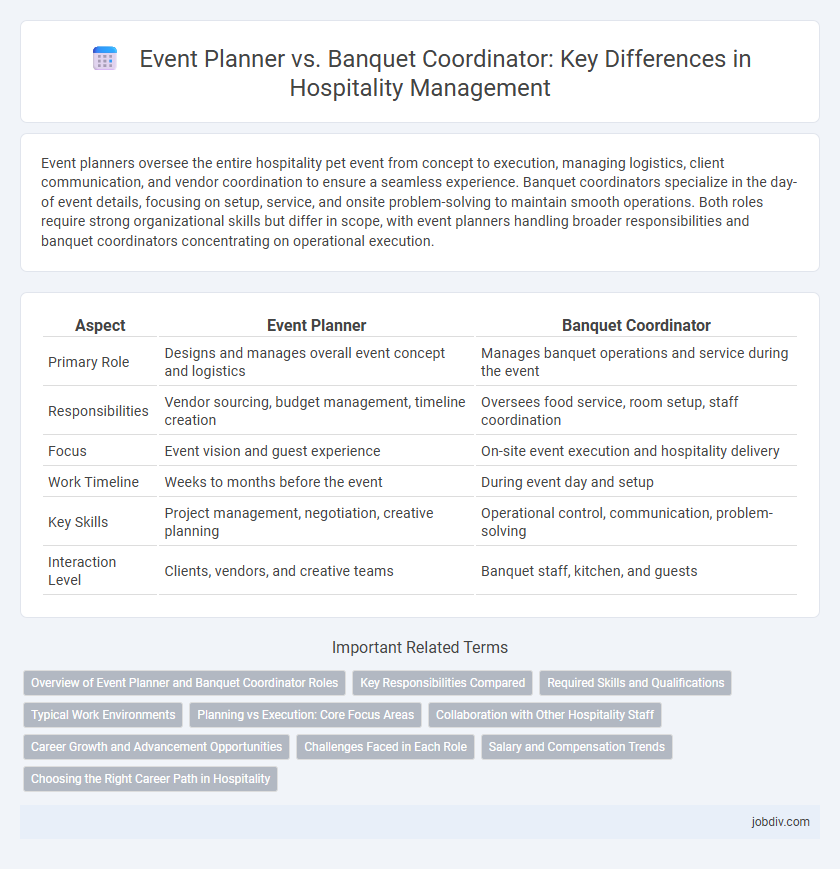Event planners oversee the entire hospitality pet event from concept to execution, managing logistics, client communication, and vendor coordination to ensure a seamless experience. Banquet coordinators specialize in the day-of event details, focusing on setup, service, and onsite problem-solving to maintain smooth operations. Both roles require strong organizational skills but differ in scope, with event planners handling broader responsibilities and banquet coordinators concentrating on operational execution.
Table of Comparison
| Aspect | Event Planner | Banquet Coordinator |
|---|---|---|
| Primary Role | Designs and manages overall event concept and logistics | Manages banquet operations and service during the event |
| Responsibilities | Vendor sourcing, budget management, timeline creation | Oversees food service, room setup, staff coordination |
| Focus | Event vision and guest experience | On-site event execution and hospitality delivery |
| Work Timeline | Weeks to months before the event | During event day and setup |
| Key Skills | Project management, negotiation, creative planning | Operational control, communication, problem-solving |
| Interaction Level | Clients, vendors, and creative teams | Banquet staff, kitchen, and guests |
Overview of Event Planner and Banquet Coordinator Roles
Event planners manage the entire event lifecycle, including budgeting, vendor coordination, and client communication to ensure seamless execution. Banquet coordinators focus specifically on on-site details during events, such as overseeing catering staff, managing dining logistics, and addressing real-time guest needs. Both roles require strong organizational skills but differ in scope, with event planners handling broader strategic planning and banquet coordinators concentrating on operational event delivery.
Key Responsibilities Compared
Event planners design and organize comprehensive event experiences, handling client consultations, budgeting, vendor negotiations, and overall event logistics. Banquet coordinators focus on the execution aspect, managing venue setup, coordinating staff, timing of service, and ensuring smooth event flow during banquets and receptions. Both roles require strong communication skills, but event planners emphasize strategic planning while banquet coordinators excel in operational management.
Required Skills and Qualifications
Event planners require strong organizational skills, budget management expertise, and proficiency in vendor negotiation to design and execute diverse events. Banquet coordinators must possess excellent attention to detail, the ability to supervise staff efficiently, and knowledge of food service operations to ensure seamless banquet execution. Both roles demand exceptional communication skills and the capability to manage client expectations effectively.
Typical Work Environments
Event planners typically work in diverse environments such as hotels, convention centers, corporate offices, and event management companies, where they oversee the entire event from conception to execution. Banquet coordinators predominantly operate within banquet halls, hotels, and catering companies, concentrating on managing the setup, service, and breakdown of food and beverage functions. Both roles require strong organizational skills, but the event planner's environment demands broader logistical coordination compared to the more specialized, on-site focus of banquet coordinators.
Planning vs Execution: Core Focus Areas
Event planners specialize in comprehensive event planning, including budgeting, vendor selection, and client consultations to align with the overall vision. Banquet coordinators concentrate on the execution side, managing on-site logistics such as seating arrangements, timing, and coordination with catering staff during the event. The core focus for event planners lies in strategic preparation, while banquet coordinators emphasize real-time operational management for flawless event delivery.
Collaboration with Other Hospitality Staff
Event planners collaborate closely with marketing teams, caterers, and venue managers to design seamless experiences tailored to client goals. Banquet coordinators work alongside chefs, servers, and audiovisual technicians to ensure smooth execution of event logistics and guest services. Both roles require effective communication and coordination with hospitality staff to deliver successful events.
Career Growth and Advancement Opportunities
Event planners typically experience broader career growth by managing diverse aspects of event production, client relations, and marketing, which can lead to senior roles like event director or corporate event manager. Banquet coordinators usually specialize in on-site event execution, offering advancement opportunities within hospitality venues such as catering manager or banquet manager positions. Developing skills in project management, negotiation, and client engagement significantly enhances advancement prospects in both career paths.
Challenges Faced in Each Role
Event planners navigate complex logistics involving multiple vendors, timelines, and client expectations, often facing challenges in budget constraints and last-minute changes. Banquet coordinators concentrate on on-site event execution, managing staff coordination, venue setup, and real-time problem-solving under pressure. Both roles demand exceptional organizational skills, but event planners handle broader strategic planning while banquet coordinators focus on operational details during events.
Salary and Compensation Trends
Event planners in hospitality typically earn an average salary ranging from $50,000 to $70,000 annually, reflecting their broader scope of responsibilities including client management and event design. Banquet coordinators usually have a more specialized role, with salaries averaging between $40,000 and $55,000, influenced by factors such as venue size and event frequency. Compensation trends show growing demand for versatile event planners, driving salary increases, while banquet coordinators benefit from steady wages tied to operational efficiency and service quality.
Choosing the Right Career Path in Hospitality
Event planners in hospitality manage overall event logistics, client relationships, and vendor coordination, requiring strong organizational and interpersonal skills. Banquet coordinators focus specifically on on-site event execution, including setup, service flow, and staff supervision, demanding attention to detail and operational expertise. Choosing between these roles depends on preference for strategic planning or hands-on event management within the hospitality industry.
Event Planner vs Banquet Coordinator Infographic

 jobdiv.com
jobdiv.com